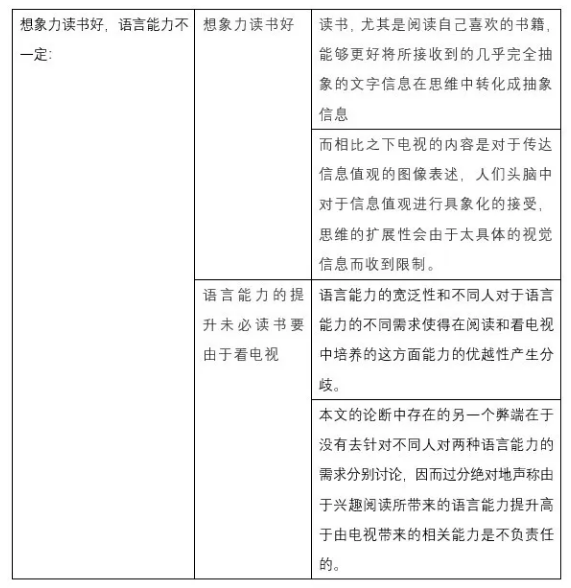Reading for pleasure can develop imagination and language skills better than watching TV. To what extent you agree or disagree?
题目大意
兴趣性阅读比看电视更能培养想象力和语言技能。你是否同意?
写作思路解析
➡️思路1:完全同意:
1. 兴趣性阅读比起看电视更能培养想象力:
想象力的本质在于对于抽象化的逻辑内容进行头脑中具象化的过程,读书,尤其是阅读自己喜欢的书籍,能够更好将所接收到的几乎完全抽象的文字信息在思维中转化成抽象信息,这个转化的过程没有任何具象化信息的限制,而相比之下电视的内容是对于传达信息值观的图像表述,人们头脑中对于信息值观进行具象化的接受,思维的扩展性会由于太具体的视觉信息而收到限制。
2. 语言能力通过兴趣性阅读会比通过看电视更加好地得到提升:
通过直观对于文字的理解和掌控,会直观地反映在对于语言能力上,无论是对于语句的理解,阅读速度,还是对于篇章的整体语言逻辑的掌控上都能够直接得到提高。相比之下,电视内容由于太过直观的动态图像和视觉信息,已经大大弱化了语言的传输力,使得人们很难通过这个方式来加强对于语言的使用和接受能力。
➡️思路2:
想象力读书好,语言能力不一定:
1. 兴趣性阅读比起看电视更能培养想象力:同上
2. 语言能力的提升未必读书要由于看电视:
语言能力的宽泛性和不同人对于语言能力的不同需求使得在阅读和看电视中培养的这方面能力的优越性产生分歧。语言能力包括对于文字的识别和书写能力,即是否能够阅读书面化或非书面化的长句,篇章和文字逻辑,以及是否能够根据不同的需求来书写文字;对于语言的口语化输出的识别理解以及针对不同情况的语言表达,及是否能够听懂语言发出者的语言指向,并是否能够通过自我的表达来传递所徐澄清的意思。而两种能力中,前者是需要大量通过阅读来完成的,然而后者,在两种行为活动中,明显看电视更加容易让人获得。本文的论断中存在的另一个弊端在于没有去针对不同人对两种语言能力的需求分别讨论,因而过分声称由于兴趣阅读所带来的语言能力提升高于由电视带来的相关能力是不负责任的。
关键词
effective 这个概念的理解是本文建立头一个层次驳斥的关键
are better第二个层次的驳斥重点
提纲梳理见下
写作示范
Amusing reading may be more likely to develop one’s imagination than may television watching, but the language skill improvement is hardly to be lumped together as the function of reading.
Those who read for fun frequently would granted be more imaginative in their life than the fans of television watching. Before scrutinizing the reasons behind this, one should first see past the essence of imagination. For most cases, to imagine something requires the ability of figure out concretized, tangible pictures or contents through relatively abstract formations. That is to say, the more presentative the input is, the more imagination one would be trained to develop. It is therefore reasonable to say that books, with literal information as the dominant medium, are considered more proper to nurture the imagination of individuals, largely due to the necessity of brain-transformation from the abstraction they convey to the configuration in mind, than tv programs, by means of which images and movements are largely involved to materialize information; too concrete interpretation to the utterance would be seen as the confine of mentality, since conventional thinking would be fostered when one is injected too much with visualized inputs.
Whereas it is irrational to state that relaxed reading always brings about more developed language skills than does watching TV. The wide range of linguistic ability, and the multiple needs for it from different people compel the both actions to hardly be compared with one another. Language skills are always widely composed: they include word input and output, meaning whether one can read informal and formal sentences or the logic in chunks and passages, and whether one can write with appropriations under different circumstances; spoken language recognition and expression are also categorized as the skills, meaning whether one can listen and get known the proper utterance others are making, and whether one can explain his own words. While reading only is likely to develop the former skills, the latter can better be gained through visual media watching. However, the claim in this prompt fails to provide certainty about what kind of ability should be acquired by the people, or what kind of people is talked about; therefore, it is irresponsible to over-state the overwhelming function of reading in terms of the language skill development without differentiation.
In conclusion, I would very much agree that effectiveness is manifest for developing one’s imagination through relaxing oneself with books more than via watching tv, but whether there would be more improvement of linguistic skills cannot be precisely judged by means of which actions.


